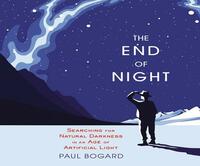Take a photo of a barcode or cover
118 reviews for:
The End of Night: Searching for Natural Darkness in an Age of Artificial Light
Paul Bogard
118 reviews for:
The End of Night: Searching for Natural Darkness in an Age of Artificial Light
Paul Bogard
inspiring
reflective
slow-paced
informative
inspiring
reflective
medium-paced
adventurous
emotional
hopeful
informative
reflective
sad
medium-paced
To love a sky - to love anything - is only a problem if you know that love is in danger.
An unbelievable exploration of a fascinating and forgotten subject - darkness. Bogard methodically analyzes the opposition to dark skies and how we can meaningfully intersect them. His timely and urgent warning provides a great motivation to make night dark again, at a time when we could perhaps need darkness’s beauty more than ever.
An unbelievable exploration of a fascinating and forgotten subject - darkness. Bogard methodically analyzes the opposition to dark skies and how we can meaningfully intersect them. His timely and urgent warning provides a great motivation to make night dark again, at a time when we could perhaps need darkness’s beauty more than ever.
informative
slow-paced
If I had started reading it knowing it was more poetic philosophy than science the score would’ve been higher. I felt like some of the subjects discussed became redundant but he did drive home a lot of interesting points and make me more appreciative of the night sky
I really enjoyed this. It was pretty much an extended essay on the encroachment of light pollution in the modern world. This may sound boring, but I really enjoyed the writing style.
A lot more philosophical than I was expecting but not in an awful way. Brought up some really really fascinating points (I have been telling my family all about it). However I do think he idealizes some things about nature and darkness, but that is also kind of the point.
The author tried too hard to fill 9 chapters to fit with Bortle's darkness scale and as a result many chapters felt superfluous or repetitive. This book uses a philosophical and poetic style that the author seems to use to explore himself versus using it to convey the beauty of what modern society has stolen from the night. When he is conveying research and stories from those leading the fight against light pollution I found I learned a lot and appreciate the overall insight.
informative
medium-paced
challenging
dark
emotional
hopeful
informative
reflective
slow-paced




